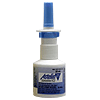Azelastine General Information

Azelastine is used to relieve nasal symptoms such as runny/itching/stuffy nose, sneezing, and post-nasal drip caused by seasonal allergies, or other allergic or non-allergic conditions. Azelastine is an antihistamine. It works by blocking certain natural substances called histamines that are responsible for allergic symptoms.
How to Use Azelastine
Read the Patient Information Leaflet provided by your pharmacist before you start using Azelastine and each time you get a refill. Follow the instructions on how to properly use Azelastine. If you have any questions regarding the information, consult your doctor or pharmacist.
Follow the instructions for properly priming the spray pump before using the bottle for the first time and if you have not used the medication for 3 or more days. Avoid spraying in your eyes or mouth.
Azelastine is for use in your nose and is available in different strengths. Use 1 or 2 sprays in both nostrils, usually once or twice a day as directed by your doctor. The dosage is based on your condition, the product you are using, and your response to treatment.
Use Azelastine regularly in order to get the most benefit from it. Remember to use it at the same time(s) each day. Azelastine usually begins working within 3 hours of use.
Azelastine Possible Side Effects
A bitter taste in the mouth, drowsiness, a burning feeling inside the nose, sneezing fits, nose bleeds, runny nose, nausea, dry mouth, headache, weight gain, muscle aches, and red eyes may occur. Strange feelings on the skin (e.g., pins and needles, crawling sensation) may also occur. If any of these effects persist or worsen, notify your doctor or pharmacist promptly.
The bitter taste can be reduced by sniffing gently through your nose after each spray, rather than breathing in through your nose so deeply that the medication goes to the back of your throat and gets into your mouth.
Remember that your doctor has prescribed Azelastine because he or she has judged that the benefit to you is greater than the risk of side effects. Many people using Azelastine do not have serious side effects.
A very serious allergic reaction to Azelastine is unlikely, but seek immediate medical attention if it occurs. Symptoms of a serious allergic reaction may include: rash, itching/swelling (especially of the face/tongue/throat), severe dizziness, trouble breathing.
Azelastine Precautions
Before using Azelastine, tell your doctor or pharmacist if you are allergic to it; or if you have any other allergies. Azelastine may contain inactive ingredients (such as preservatives like benzalkonium chloride), which can cause allergic reactions or other problems. Talk to your pharmacist for more details.
Before using Azelastine, tell your doctor or pharmacist your medical history, especially of: kidney problems.
Azelastine may make you drowsy. Do not drive, use machinery, or do any activity that requires alertness until you are sure you can perform such activities safely. Limit alcoholic beverages.
Azelastine should be used only when clearly needed during pregnancy. Discuss the risks and benefits with your doctor.
It is not known whether Azelastine passes into breast milk. Consult your doctor before breast-feeding.
Azelastine Possible Intercations
Your healthcare professionals (e.g., doctor or pharmacist) may already be aware of any possible drug interactions and may be monitoring you for it. Do not start, stop or change the dosage of any medicine before checking with them first.
Before using Azelastine, tell your doctor or pharmacist of all prescription and nonprescription/herbal products you may use, especially of: cimetidine.
Tell your doctor or pharmacist if you also take drugs that cause drowsiness such as: other antihistamines (e.g., diphenhydramine), anti-anxiety drugs (e.g., diazepam), anti-seizure drugs (e.g., phenobarbital), medicine for sleep (e.g., zolpidem), muscle relaxants, narcotic pain relievers (e.g., codeine), psychiatric medicines (e.g., phenothiazines such as chlorpromazine or tricyclics such as amitriptyline), tranquilizers.
Check the labels on all your medicines (e.g., cough-and-cold products) because they may contain drowsiness-causing ingredients. Ask your pharmacist about the safe use of those products.